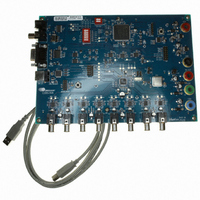CDB5368 Cirrus Logic Inc, CDB5368 Datasheet - Page 21

CDB5368
Manufacturer Part Number
CDB5368
Description
BOARD EVAL FOR CS5368 192KHZ ADC
Manufacturer
Cirrus Logic Inc
Specifications of CDB5368
Number Of Adc's
1
Number Of Bits
24
Sampling Rate (per Second)
192k
Data Interface
Serial
Inputs Per Adc
8 Differential
Input Range
±0.3 V
Voltage Supply Source
Analog and Digital
Operating Temperature
-40°C ~ 85°C
Utilized Ic / Part
CS5368
Description/function
Audio A/D
Operating Supply Voltage
3.3 V
Product
Audio Modules
For Use With/related Products
CS5368
Lead Free Status / RoHS Status
Contains lead / RoHS non-compliant
Lead Free Status / RoHS Status
Lead free / RoHS Compliant, Contains lead / RoHS non-compliant
Other names
598-1157
DS624F4
4.4
4.4.1 Synchronization of Multiple Devices
Master and Slave Operation
CS5368 operation depends on two clocks that are synchronously derived from MCLK: SCLK and LRCK/FS.
See
The CS5368 can operate as either clock master or clock slave with respect to SCLK and LRCK/FS. In Mas-
ter Mode, the CS5368 derives SCLK and LRCK/FS synchronously from MCLK and outputs the derived
clocks on the SCLK pin (pin 25) and the LRCK/FS pin (pin 24), respectively. In Slave Mode, the SCLK and
LRCK/FS are inputs, and the input signals must be synchronously derived from MCLK by a separate device
such as another CS5368 or a microcontroller.
both Master and Slave Modes.
The Master/Slave operation is controlled through the settings of M1 and M0 pins in Stand-Alone Mode or
by the M[1] and M[0] bits in the Global Mode Control Register in Control Port Mode. See
23
To ensure synchronous sampling in applications where multiple ADCs are used, the MCLK and LRCK must
be the same for all CS5368 devices in the system. If only one master clock source is needed, one solution
is to place one CS5368 in Master Mode, and slave all of the other devices to the one master, as illustrated
in
external source and time the CS5368 reset de-assertion with the falling edge of MCLK. This will ensure that
all converters begin sampling on the same clock edge.
Figure
for more information regarding the configuration of M1 and M0 pins or M[1] and M[0] bits.
Section 4.5 on page 22
9. If multiple master clock sources are needed, one solution is to supply all clocks from the same
Figure 9. Master and Slave Clocking for a Multi-Channel Application
Master
ADC as
master
clock
ADC
LRCK/FS
SCLK
for a detailed description of SCLK and LRCK/FS.
Figure 8. Master/Slave Clock Flow
SCLK & LRCK/FS
Controller
Figure 8
illustrates the clock flow of SCLK and LRCK/FS in
Slave1
Slave2
Slave3
ADC
ADC
ADC
ADC as
slave
clock
LRCK/FS
SCLK
Controller
Section 4.6 on page
CS5368
21



















